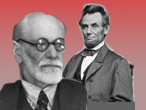With the recent swing of North Korean nuclear threats comes a question: What’s the point?
Well, North Korea gets the point, because each gambit affects even the mighty West. At the same time, the mighty West misses the point, which is why Obama offers a so-called rational explanation of his policies to decrease America’s nuclear capability.
We have more than we need, he says. Well, that sounds rational enough. We assessed the number of nuclear warheads we’d need to wipe out our enemies. Then we assess the likelihood of any of these failing. If we need 100 successful trips from ours silos to enemy cities, and the failure rate is 10%, well, we need 110 warheads in the silos. Rational.
But is it rational to act on irrational perceptions of power. Or, would the psychologically minded among us agree that ration is all that matters?
Yes, ration misses the point. The point is that when people perceive you are powerful and care about being powerful, you are fearsome. That is why the 800 gorilla gets to sit wherever he or she wants to. It is because that 800 pound gorilla can maim any of us other gorillas. Even if it doesn’t want to wield such power, watch out, because it could change its mind and use it.
That is the point of the perception of power. If a country cares about power and shows it, e.g by building up its arsenal, the perception is that it could and would use it. However, if the 800 pound gorilla backs away like a baby Huey (the fearful giant), the perception is that it will not use that power.
Remember, people–and animals–make decisions based on the perception of power. That is why a male challenging the pack leader backs off once he perceives that leader is more powerful–and ready, willing, and able (RWA)–to use that power. If the pack leader is truly more powerful but is not perceived as RWA to use that power, the challenger continues to fight.
That is why the Turkish leader Ataturk, and many before and after him, have held off challengers–they created the perception of power. That is why the West annihilated Sadam Hussein, because he, though a challenger, was perceived as having power and being RWA to use it. That is why Hitler, once perceiving the West was not RWA to use power, continued his exploits. The same for Castro after the unwillingness of the West to use its power. And I can go on and on.
The perception of power precipitates peace. Everybody moves aside and lets that 800 pound gorilla take whatever seat it wants. Peace is the point of the perception of power.
And when the mightiest country in the West deemphasizes its power, the perception is that it is not ready, or not willing, or not able to use it. It is irrational to act against the meaning countries make of any cutback in the RWA of power. It invites more North Korean antics, not less.
There are unconscious reasons why a large segment of any population does not get this, while others get it intuitively. These reasons will be covered in other posts.

 Can you immagine how the political ideas and aspirations envisioned by Abraham Lincoln and the exploration of the psychological mind explored by Sigmund Freud can be seen as one entity?
Can you immagine how the political ideas and aspirations envisioned by Abraham Lincoln and the exploration of the psychological mind explored by Sigmund Freud can be seen as one entity?